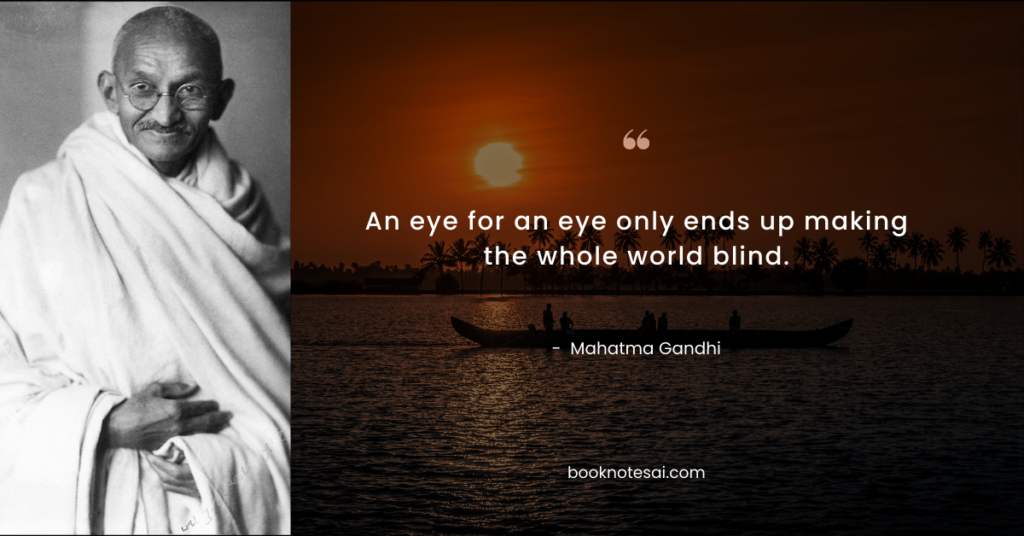Listen To This Post
Mahatma Gandhi Autobiography Summary: The Story Of My Experiments With Truth. The Journey of Self-Discovery.
It is a true inspiration to read this personal account of the life of the man who freed India from colonization through the Satyagraha – nonviolent protest – movement.

This is a book summary for Mahatma Gandhi Autobiography: The Story Of My Experiments With Truth by M. K. Gandhi. The essential information is structured to be straightforward, useful, and valuable, all while helping you save plenty of time.
Introduction: Why this book?
- In Mahatma Gandhi Autobiography: The Story Of My Experiments With Truth, M. K. Gandhi takes you through his profound journey of self-exploration and moral growth, offering invaluable insights into human nature and the pursuit of truth.
- This autobiography is not merely a historical account but a timeless narrative that challenges readers to reflect on their own principles and values, making it a must-read for anyone seeking wisdom and inspiration.
Mahatma Gandhi Autobiography Summary:
- Gandhi’s autobiography delves into his early years, his struggles with identity, and his awakening to the power of nonviolent resistance.
- Through vivid anecdotes and introspective reflections, he elucidates the transformative journey that led him to become the beacon of peace and justice known worldwide.
- The narrative underscores the importance of integrity, simplicity, and compassion in effecting positive change and fostering harmonious relationships.
- Gandhi’s unwavering commitment to Satyagraha, or truth-force, serves as a guiding principle for individuals seeking to navigate moral dilemmas and uphold their convictions.
- Ultimately, the autobiography imparts timeless lessons on the pursuit of truth, the resilience of the human spirit, and the enduring power of nonviolence.
💡 5 Big Ideas
- The Power of Truth and Nonviolence: Gandhi advocates for the transformative potential of truth and nonviolence, emphasizing that these principles can catalyze profound social and personal change.
Implementing honesty and nonviolent resistance in daily life fosters empathy, understanding, and constructive dialogue, paving the way for reconciliation and justice. - Self-Reflection and Moral Integrity: Through introspection and self-examination, individuals can cultivate moral integrity and align their actions with their deepest values.
Gandhi’s commitment to self-improvement underscores the significance of humility, accountability, and ethical conduct in fostering personal growth and societal progress. - Courage in Adversity: Gandhi’s unwavering courage in the face of adversity exemplifies the resilience of the human spirit and the power of conviction.
By confronting challenges with grace and determination, individuals can transcend fear and emerge stronger, inspiring others to persevere in the pursuit of justice and righteousness. - The Pursuit of Simplicity: Embracing simplicity and frugality enables individuals to prioritize what truly matters and lead lives of purpose and fulfillment.
Gandhi’s lifestyle embodies the ethos of simplicity, emphasizing the intrinsic value of contentment, self-reliance, and environmental stewardship. - Compassionate Leadership: Gandhi’s visionary leadership style emphasizes empathy, inclusivity, and servant leadership, empowering individuals to effect positive change through collaboration and solidarity.
By cultivating compassion and humility, leaders can inspire trust, unity, and collective action, fostering a more just and equitable society.
In essence, Gandhi’s autobiography advocates for the transformative power of truth, nonviolence, self-reflection, courage, simplicity, and compassionate leadership in fostering personal and societal transformation.
Powerful Quotes
- “Be the change you wish to see in the world.”
This quote encourages individuals to embody the values they espouse, inspiring transformative action and collective progress. - “An eye for an eye only ends up making the whole world blind.”
This quote highlights the futility of revenge and the imperative of forgiveness and reconciliation in promoting peace and harmony. - “The best way to find yourself is to lose yourself in the service of others.”
This quote underscores the intrinsic value of altruism and the fulfillment derived from selfless acts of kindness and compassion. - “The greatness of a nation and its moral progress can be judged by the way its animals are treated.”
This quote emphasizes the interconnectedness of compassion, ethics, and social justice, urging societies to extend empathy and protection to all sentient beings. - “Happiness is when what you think, what you say, and what you do are in harmony.”
This quote encapsulates the essence of authenticity and integrity, highlighting the alignment between thoughts, words, and actions as a pathway to genuine happiness and fulfillment. - “In a gentle way, you can shake the world.”
This quote underscores the profound impact of peaceful activism and nonviolent resistance in effecting systemic change and challenging injustice. - “First they ignore you, then they laugh at you, then they fight you, then you win.”
This quote traces the trajectory of social movements and the inevitable triumph of truth and justice over oppression and tyranny. - “Strength does not come from physical capacity. It comes from an indomitable will.”
This quote celebrates the resilience of the human spirit and the power of determination and perseverance in overcoming obstacles and adversity. - “The weak can never forgive. Forgiveness is the attribute of the strong.”
This quote extols the virtues of forgiveness and compassion as acts of moral courage and spiritual strength. - “Live as if you were to die tomorrow. Learn as if you were to live forever.”
This quote underscores the value of lifelong learning and the pursuit of knowledge as a means of personal enrichment and intellectual growth.
One Reason To Read This Book:
Embark on a transformative journey of self-discovery and moral enlightenment alongside Mahatma Gandhi, whose timeless wisdom and unwavering commitment to truth and nonviolence continue to inspire and resonate with readers worldwide.
Who should I recommend Mahatma Gandhi Autobiography: The Story Of My Experiments With Truth Summary to?
This summary is ideal for individuals of all ages and backgrounds who seek profound insights into the human condition, moral philosophy, and the pursuit of social justice.
Whether you’re a student, activist, educator, or lifelong learner, Gandhi’s autobiography offers invaluable lessons and inspiration for anyone striving to create a more just, compassionate, and equitable world.
Recommendations:
- The Essential Writings of Mahatma Gandhi edited by Raghavan Iyer
- Gandhi: An Autobiography – The Story of My Experiments with Truth by Mahatma Gandhi (Complete and Unabridged)
- Nonviolent Communication: A Language of Life by Marshall B. Rosenberg, Ph.D.
- The Art of Happiness by Dalai Lama and Howard C. Cutler, M.D.
This summary serves as a complimentary guide to the reviewed title Mahatma Gandhi Autobiography: The Story Of My Experiments With Truth, offering key insights. For a deeper understanding, we encourage you to explore the full book.


